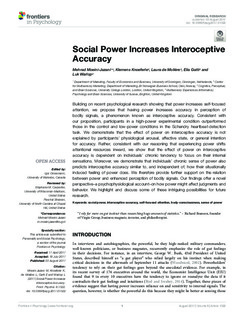Social Power Increases Interoceptive Accuracy
Journal article, Peer reviewed
Accepted version
Permanent lenke
http://hdl.handle.net/11250/2462020Utgivelsesdato
2017Metadata
Vis full innførselSamlinger
- Publikasjoner fra CRIStin - BI [1015]
- Scientific articles [2173]
Originalversjon
Frontiers in Psychology, 2017, 8(1322), 1-12 https://doi.org/10.3389/fpsyg.2017.01322Sammendrag
Building on recent psychological research showing that power increases self-focused attention, we propose that having power increases accuracy in perception of bodily signals, a phenomenon known as interoceptive accuracy. Consistent with our proposition, participants in a high-power experimental condition outperformed those in the control and low-power conditions in the Schandry heartbeat-detection task. We demonstrate that the effect of power on interoceptive accuracy is not explained by participants’ physiological arousal, affective state, or general intention for accuracy. Rather, consistent with our reasoning that experiencing power shifts attentional resources inward, we show that the effect of power on interoceptive accuracy is dependent on individuals’ chronic tendency to focus on their internal sensations. Moreover, we demonstrate that individuals’ chronic sense of power also predicts interoceptive accuracy similar to, and independent of, how their situationally induced feeling of power does. We therefore provide further support on the relation between power and enhanced perception of bodily signals. Our findings offer a novel perspective–a psychophysiological account–on how power might affect judgments and behavior. We highlight and discuss some of these intriguing possibilities for future research.
Beskrivelse
This is an Open Access journal available from http://journal.frontiersin.org/journal/psychology
